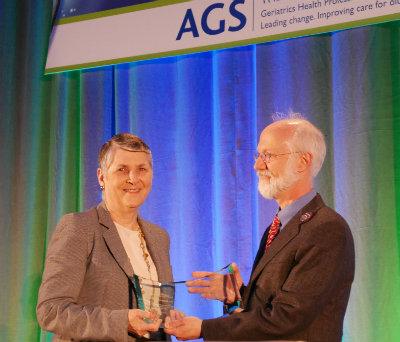 Dr. Corinne H. Rieder, left, accepts the David H. Solomon Memorial Public Service Award from AGS President Dr. Wayne McCormick.
Dr. Corinne H. Rieder, left, accepts the David H. Solomon Memorial Public Service Award from AGS President Dr. Wayne McCormick.Editor’s Note: Corinne H. Rieder, EdD, executive director and treasurer of the John A. Hartford Foundation, was honored at last week’s American Geriatrics Society (AGS) annual meeting with the David H. Solomon Memorial Public Service Award. The award recognizes her body of work dedicated to improving the lives and health of older Americans.
Dr. Rieder has been instrumental in making grants and initiating programs that put geriatrics expertise to work in all health care settings by: advancing practice change and innovation; supporting team-based care through interdisciplinary education of all health care providers; and developing and disseminating new evidence-based models that deliver better, more cost-effective health care. The following is the text of her acceptance speech, delivered to an audience that included many Hartford grantees, scholars, and fellows. We have added helpful links to specific programs for those interested in more information.
I would like to thank the American Geriatrics Society for this award. The David H. Solomon Memorial Public Service Award is very special to me. David was an early and outstanding leader in academic geriatrics and practice, and I was very fortunate to have had the opportunity to fund and work with him. And, we were connected because we both laid claim to UCLA as our “Mother” University.
I am honored to be a recipient and accept it on behalf of the Foundation and Hartford’s grantees. To my colleagues, friends, and our grantees who are here: This is your award.
I believe that together, we are truly making a difference in improving the health and health care of older people. These are just some of the projects that Hartford has funded that we are very proud of:
- The development of basic geriatrics competency standards has been embedded into training curricula for social workers, nurses, and physicians at most schools across the country.
- More than 3,000 scholars and grantees in medicine, nursing, and social work have been supported and many have been a part of developing today's more robust knowledge base and have trained hundreds of thousands of students in good geriatric care.
These outstanding faculty include Jahnigen Scholars in the surgical specialties supported through our grants to the American Geriatrics Society, the Williams Scholars sponsored by the Alliance for Academic Internal Medicine, the Beeson Scholars supported by our partnership with the National Institute on Aging and the American Federation for Aging Research, and the Fagin Fellows and Archbold Scholars in geriatric nursing and the Faculty Scholars and Doctoral Fellows in geriatric social work, sponsored through the Gerontological Society of America.
Evidence-based, cost-effective geriatric care models are also being implemented across the country as the result of Hartford funding. For example:
- The Care Transitions Program, developed by Eric Coleman, is reducing the likelihood of avoidable hospital readmissions by half and is in use in nearly 900 organizations across 43 states.
- Jurgen Unitzer’s IMPACT, the evidence-based depression care project, has been implemented in 1,000 clinics nationwide.
- The Center to Advance Palliative Care (CAPC), led by Diane Meier, is increasing the availability of quality palliative care services, and is now in 90 percent of large hospitals.
- The On Lok model, led for many years by AGS CEO Jennie Chin Hansen, received funding from Hartford to demonstrate its effectiveness. Currently, more than 100 PACE (Program of All-Inclusive Care for the Elderly) organizations in the U.S. have one or more PACE sites in over 30 states.
- The NICHE program (Nurses Improving Care for Healthsystem Elders), developed by Terry Fulmer, has a network of more than 500 hospitals and is successful in improving the care of older patients.
- The HPPAE program (Hartford Partnership Program for Aging Education), designed and disseminated by Pat Volland at the New York Academy of Medicine, has changed social work education by rotating students through a variety of agencies that serve older adults. It has been adopted in 97 schools of social work in 39 states.
This is just a short list showing how you, our grantees, have enabled the Hartford Foundation to achieve its goals. Thank you very much.
